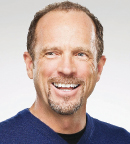Cancer Doesn’t Frighten Me

Cancer Doesn’t Frighten Me
Living with advanced-stage lung cancer awakened me to live my best life.
By Matt Ellefson, as told to Jo Cavallo
September 25, 2018
In the fall of 2009, I suddenly went from being a healthy, physically active 47-year-old to a patient with stage IV non–small lung cancer (NSCLC), with a 5-year survival rate of less than 5%. A never-smoker, I had attributed a persistent cough I’d been having to the change in the season. And why wouldn’t I? I didn’t look or feel sick. It wasn’t until I coughed up blood one morning that I knew I was seriously ill.
A computed tomography (CT) scan of my upper body showed a large mass in my right lung and lesions on the lymph nodes throughout my chest, shoulders, and neck. A biopsy of one of the lymph nodes determined that I had advanced-stage lung cancer and further testing found that I was negative for EGFR and KRAS gene mutations. It wasn’t until much later, when genomic sequencing had become more sophisticated, that I learned my cancer does harbor the ALK gene rearrangement, which is found in some nonsmokers with my type of lung cancer.
Equally distressing was the realization I didn’t have confidence in the first oncologist I met with. I did not feel that he could effectively treat the life-threatening disease I faced. I live in a major city in the Midwest and assumed, after seeing all those ads on TV touting the merits of specific cancer hospitals, that I could go to my local cancer center and find high-quality oncology care. I was disappointed. The oncologist seemed uncomfortable answering the questions I posed and unsure about the effectiveness of the treatment he was recommending. Even worse, he didn’t offer anything encouraging about my prognosis. I knew I had to take control of the situation and learn everything I could about NSCLC. I needed to find the best treatment strategies to increase that dismal 5-year survival rate.
Taking Charge
MY PROFESSIONAL background is in mechanical engineering, so doing research and finding solutions to problems is in my DNA. Now, I was facing the greatest challenge of my life: how to beat a disease I knew nothing about? My wife, Melissa, my brother-in-law, Josh, and I manned three laptops in search of information about NSCLC and the academic cancer centers in the country doing innovative research in the disease. After a frustrating and exhausting effort, it was prayer that guided me to a qualified academic research center. I was encouraged by the medical team I met with there to enter a clinical trial for a combination chemotherapy regimen of carboplatin and paclitaxel, plus erlotinib (Tarceva)—even though I don’t have the EGFR mutation, my oncologist thought I could benefit from the kinase inhibitor—and daily doses of radiation.
Although the treatment was harsh, I tolerated it well. I able even to maintain several gym workout days each week. Melissa and I learned all we could about living a healthy lifestyle, and I believe it made a big difference in my recovery. After 5 months on the treatment, I achieved a complete remission, which lasted for a year.
Receiving a Miracle
I KNOW advanced-stage cancer is incurable, Still I was hoping for a cure and chasing the goal of staying disease-free until I could reach that 5-year magic number. Therefore, it was especially disappointing to learn the cancer was back after just 1 year. I needed to find a new plan—one that would bring me back to that disease-free state. I needed a miracle. I was waiting to see my oncologist for a follow-up visit when I received an e-mail alerting me that the U.S. Food and Drug Administration had just approved crizotinib (Xalkori) for ALK-positive NSCLC. During that appointment, I requested a test for the ALK rearrangement, which revealed that I was ALK-positive. I have a very strong faith and I don’t think it was pure coincidence that, literally, several minutes before I saw my oncologist, crizotinib was approved.
Within 2 weeks of starting crizotinib therapy, my tumors started shrinking. My energy level increased so much that I started training for my first half-marathon, which I ran 3 months later.
Crizotinib was remarkably effective for me for 54 months, when I once again relapsed. Since then, I’ve been treated with alectinib (Alecensa), which was successful at shrinking my tumors but caused a pleural effusion and contributed to the collapse of my right lung. My current therapy is brigatinib (Alunbrig).
In addition to the drugs, I’ve had 12 surgeries and 51 radiation treatments. Even with aggressive therapy, my cancer has been relentless in its spread throughout my body, including my brain, bones, liver, adrenal gland, lymph nodes, and left lung. Despite everything I’ve been through, I’m not worried. My strong faith keeps me grounded and I do not fear cancer. In fact, having this disease has enhanced my life.
Redefining Success
BEFORE MY diagnosis, success for me was defined by how much money I made and the size of my house. Now, I measure success by how many other cancer survivors I can help through my website (SURVIVEiT) and with one-on-one mentoring. I’m also dedicating my time to improving access to effective care for every patient with cancer.
Nine years ago, I was essentially given a death sentence. Instead, I’m living the best life. ■
Mr. Ellefson lives in Sioux Falls, South Dakota, with his wife, Melissa, and their large family. He is the Founder and Chief Executive Officer of SURVIVEiT, a nonprofit online resource for cancer survivors.
Editor’s Note: Columns in the Patient’s Corner are based solely on information The ASCO Post received from the survivors interviewed and should be considered anecdotal.
Article via The ASCO Post.
